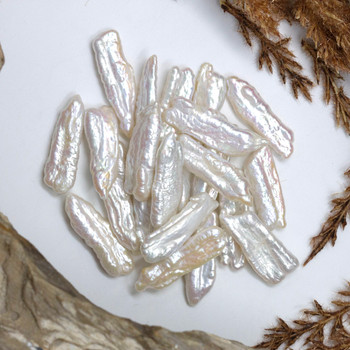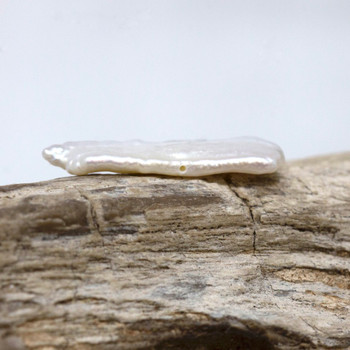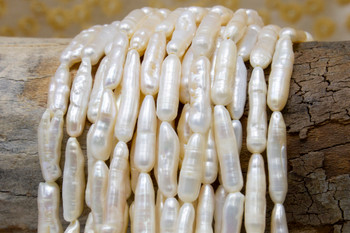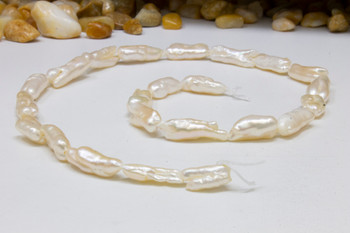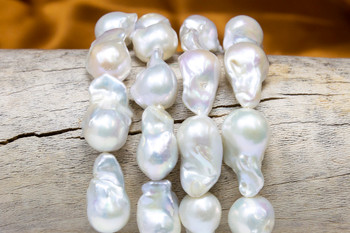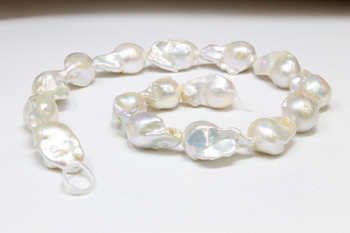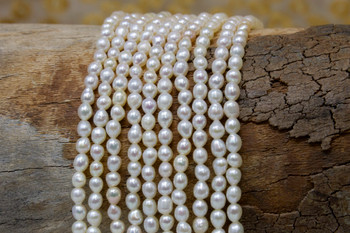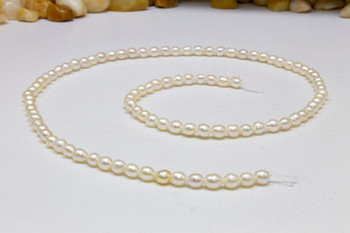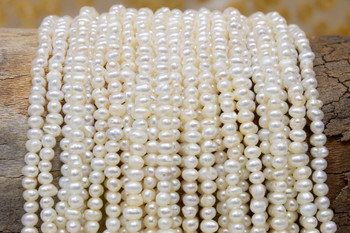Description
- Approximate beads per strand: 65
- What is it: Named after Thomas Edison, Edison Pearls are a new type of pearl that has hit the market in the last few years. Basically, they are a fusion of saltwater and freshwater pearl techniques. To fully understand and appreciate the magnificence of Edison pearls, let's first talk about the differences between the traditional saltwater and freshwater pearl techniques. Saltwater pearls, cultivated in the ocean, are produced by nucleating (aka inserting) a round starter bead into a mollusk. Only one bead is inserted into the mollusk at a time. The mollusk then coats the bead with nacre, creating the pearl. The round bead nucleus leads to an ideal round or near round pearl. This shape is considered the gold standard in the pearl industry. However, because saltwater pearls are cultivated in the ocean rather than in pearl farms, and because a mollusk only makes one pearl at a time, the saltwater process is pretty slow and inefficient, making saltwater pearls inherently more expensive. Freshwater pearls, on the other hand, are cultivated in rivers, lakes, and streams, often in dedicated pearl farms. The freshwater mussels are typically tissue-nucleated instead of bead nucleated. Rather than inserting a round starter bead, a small piece of shell or other irritant is inserted into the mussel. Certain freshwater shapes like coins and baroque pearls are the exception to this and nucleated with a bead to create the desired pearl shape, but for the most part freshwater pearls are created with an irregular irritant. The mussel then coats the irritant with nacre, creating the pearl. Unlike the saltwater round starter bead technique, this freshwater irregular irritant technique allows the mussel to be nucleated with several starter pieces at once, which allows the mussel to make multiple pearls at the same time. This, along with being cultivated in freshwater pearl farms, makes the freshwater pearl technique much more efficient and leads to a much less expensive pearl. The irregular irritants, however, also lead to more irregular pearls than the perfectly round or near-round bead-nucleated saltwater pearls. Obviously both methods have their perks, so about 20 years ago in the Zhejiang region of China, the Zhan family began experimenting with a hybrid of the two processes. After many years they have landed on a patented process that created the Edison Pearl. They are essentially a freshwater pearl that utilizes the saltwater technique of bead-nucleating. With Edison Pearls, each mussel is nucleated with one (and only one) round starter bead. The pearls are then cultivated in the freshwater pearl farms. The round starter bead leads to a stunning round, near-round, or baroque pearl. The starter bead is typically 5-8mm and the finished Edison Pearl is usually 10-16mm. After around 3 years of growth, the harvested Edison Pearls are stunning! They are known for their high, almost metallic, luster and their smooth surfaces. They naturally occur in a stunning range of white, lavender, pink, champagne, silver, peach, etc. The Edison Pearls' beauty easily rivals that of the previously-ideal saltwater pearls, but the more efficient freshwater culturing process makes them more affordable than saltwater pearls. Since each mussel only grows one Edison pearl at a time, they do cost more than other freshwater pearls in which many are grown at once, but they are still much less expensive than the saltwater pearls for a similarly stunning pearl thanks to the freshwater culturing benefits.
- Because gemstones are natural materials, appearances may vary from bead to bead.
Additional Information
Finish: |
Polished |
Hole Size: |
.5mm |
Approx. Strand Length: |
16 inches |
Shape: |
Assorted |
Sold: |
By the strand |
Color: |
White |
Material: |
Pearl |
Dimensions: |
6.5x14mm |
Range: |
6-7.9mm |
Range: |
12-15.9mm |







